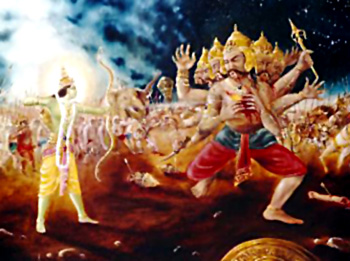 Ravana mourned in Lanka by all the rakshasas and the rakshasis and even his younger brother Vibhishana mourned the death of his brother. After Rama killed Ravana in a furious battle which was witnessed by all the gods of the universe, Vibhishana lamented for his brother sadly, and Rama comforted him by saying that a hero slain in battle should not be mourned. He also told that success in battle is not for ever and told Vibhishana to perform the funeral rites of his elder brother. He also informed Vibhishana that after death Ravana did not remain his enemy and he became as dear to him as Vibhishana. While Rama was consoling Vibhishana, there came out from the kingdom of Lanka a host of weeping rakshasis seeking their lord and wailing bitterly.
Ravana mourned in Lanka by all the rakshasas and the rakshasis and even his younger brother Vibhishana mourned the death of his brother. After Rama killed Ravana in a furious battle which was witnessed by all the gods of the universe, Vibhishana lamented for his brother sadly, and Rama comforted him by saying that a hero slain in battle should not be mourned. He also told that success in battle is not for ever and told Vibhishana to perform the funeral rites of his elder brother. He also informed Vibhishana that after death Ravana did not remain his enemy and he became as dear to him as Vibhishana. While Rama was consoling Vibhishana, there came out from the kingdom of Lanka a host of weeping rakshasis seeking their lord and wailing bitterly.
Mandodari, the queen of the slain king Ravana lamented in the battlefield for the death of her husband. She addressed the dead Ravana as the younger brother of Vaisravana and told that there was no one in the world who could stand before him and at last he was slain by a man fighting on foot and that was only because of the abduction of Sita and thus she became a became a widow. She lamented also since Ravana did not listen to her words before and the one who used to sleep in the palace was then sleeping dead over dust in the battlefield. She lamented since Ravana left her alone and cried for he was not speaking any more.
While Mandodari was heavily lamenting for the death of her husband Ravana, the other wives of Ravana consoled her and lifted her up, and told her that life remains uncertain and all things change in this universe. By that time, Vibhishana made ready the funeral pyre, and Ravana was taken to the burning-ground and burnt with every rite and honour which was due to a hero. The wives of Ravana returned to Lanka, and the gods departed to their own place. Then Lakshmana, taking water brought from the ocean by Sugriva in a golden jar, anointed Vibhishana as lord of the city of Lanka and king of the rakshasas, and also the monkeys and rakshasas both rejoiced.



















